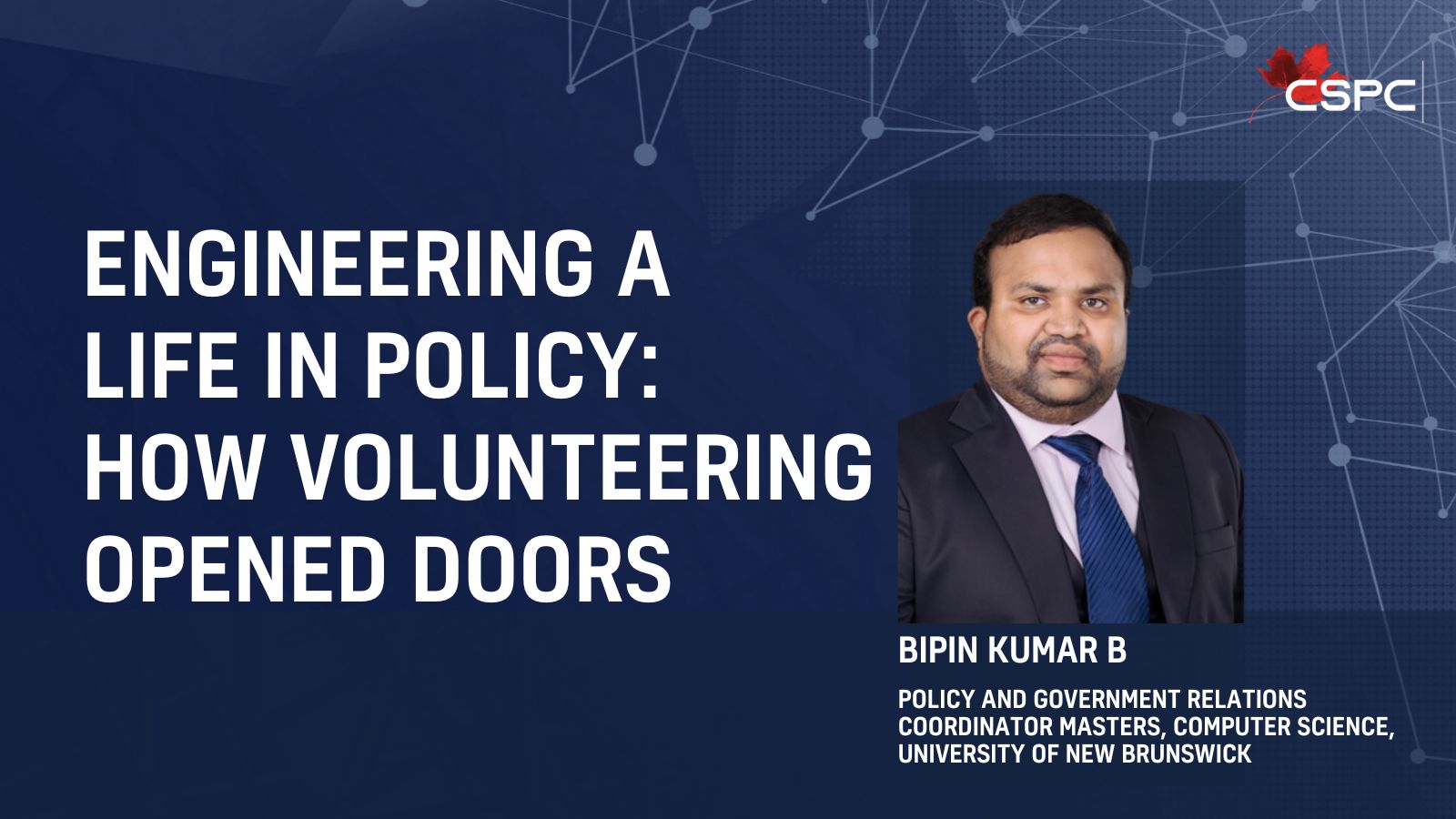Engineering a life in policy: How volunteering opened doors

Author(s):
Bipin Kumar B
University of New Brunswick
Policy and Government Relations Coordinator Masters, Computer Science
Disclaimer: The French version of this text has been auto-translated and has not been approved by the author.
I arrived in Canada with an engineering degree in my backpack, a master’s admission under my arm, and a vague but persistent curiosity about how societies decide what matters. Growing up in India, I had little sense that public policy could be a career; I knew politicians and I knew engineers, but I didn’t know that there was a whole world of people who translated research into rules, programs and public goods. It wasn’t until I studied abroad — first in Germany, then in a dual master’s program that brought me to Canada — that volunteering nudged that curiosity into a vocation.
My first volunteer role at the Canadian Science Policy Centre was gloriously small: a digital note-taker during a pandemic-era session. Even that modest task felt like discovery work. Sitting in on panels, capturing the cadence of arguments, and then seeing those ideas take shape in post-event materials, I realized policy was a craft you could learn and practice. That realization set me on a path from listener to contributor, and eventually to co-chair of CSPC’s Events Committee, a role I’ve been privileged to hold for the last two years.
Volunteering at CSPC became a classroom with no walls. On the Program and Workshops committees, I learned the logistics of convening — how to design sessions that surface useful debate, how to shepherd speakers with different priorities to common ground, and how to translate technical research into a format that policy practitioners and the public can engage with. Co-chairing the Events Committee deepened those lessons: I learned to lead teams, balance competing constraints, and improvise when the best-laid plans met real-world friction. Running the CSPC interview series was one of my favourite challenges — it pushed me to craft questions that reveal not just what experts know, but why it matters for policy.
Importantly, those volunteer experiences were not isolated; they catalyzed professional development and research opportunities. CSPC’s workshops — SciPol 101, especially — introduced me to the multiple career trajectories within science policy. I completed the Certificate of Public Policy and Management, which gave me formal training to match the practical skills I’d been acquiring. Through networks I built while volunteering, I contributed to a policy paper in the Journal of Science Policy and Governance on improving access to Federal Graduate Research Awards, and I led a policy paper on climate migration. These projects taught me how to translate empirical evidence into feasible recommendations, and to write for policy audiences who need clarity and a path to action.
Volunteering also opened doors beyond Canadian borders. Last year, I was accepted as a CanStudyUS Policy Fellow with The Dais — a public policy and leadership think tank at Toronto Metropolitan University — where I developed a policy brief on establishing AI liability and post-deployment frameworks in Canada. Earlier this year, I co-authored “A G7 Strategy for AI Competition and Consumer Rights” for the Think7 Summit 2025 — work that fed into the materials presented to Canada’s G7 Presidency. Most recently, I published a policy brief titled “Tax-Ready” Real-Time Payments: Leveraging UPI to Expand India’s Tax Base and Support MSME Growth for Centre for International Governance Innovation (CIGI)’s Future of Digital Finance conference. Each brief sharpened my appreciation for the iterative nature of policy work: evidence, stakeholder engagement, drafting, feedback, and revision — often under time and resource constraints.
If there’s one theme that runs through my volunteer and early-career work, it’s interdisciplinarity. The policy problems I want to work on — AI governance, climate migration, digital finance — are not siloed. They connect technology, economics, law and social equity. CSPC’s community reflects that intersectorality: researchers, practitioners, students, and civil society actors who test ideas against diverse perspectives. Being part of that community taught me how to translate disciplinary jargon into policy-ready recommendations, and how to design events and outputs that invite participation from people whose voices are often absent from decision-making tables.
Volunteering also gave me confidence. As someone who started with an engineering background in a new country, it would have been easy to ask, “Who am I to comment on policy?” But volunteer roles that progressively increased responsibility — from note-taker to committee lead to interviewer and convenor — provided practical proof that contribution matters. It’s one thing to learn concepts in a classroom; it’s another to apply them in public-facing work where clarity and timeliness matter.
To future volunteers, my encouragement is simple: show up, and then show up again—small contributions compound. Attend one session, then offer to take notes. Help organize a workshop, pitch a speaker, and write a short brief. You’ll learn project management, stakeholder engagement, clear writing and — crucially — how to listen in ways that inform policy. The science-policy community thrives when early-career voices bring curiosity, humility and persistence.
I am grateful to CSPC for creating spaces where volunteers can evolve into practitioners, and to the many mentors and peers who have guided my learning. Volunteering changed the trajectory of my career: it turned a childhood interest in public affairs into a life’s work in policy research and advocacy. The tools I gained — networks, skills, and the habit of translating evidence into action — will stay with me as I continue working at the intersection of technology, equity and climate. If my journey shows anything, it’s that the door into policy is not reserved for those who always knew they belonged there — sometimes it opens because someone asked you to take a note, and you stayed to write the next chapter.

